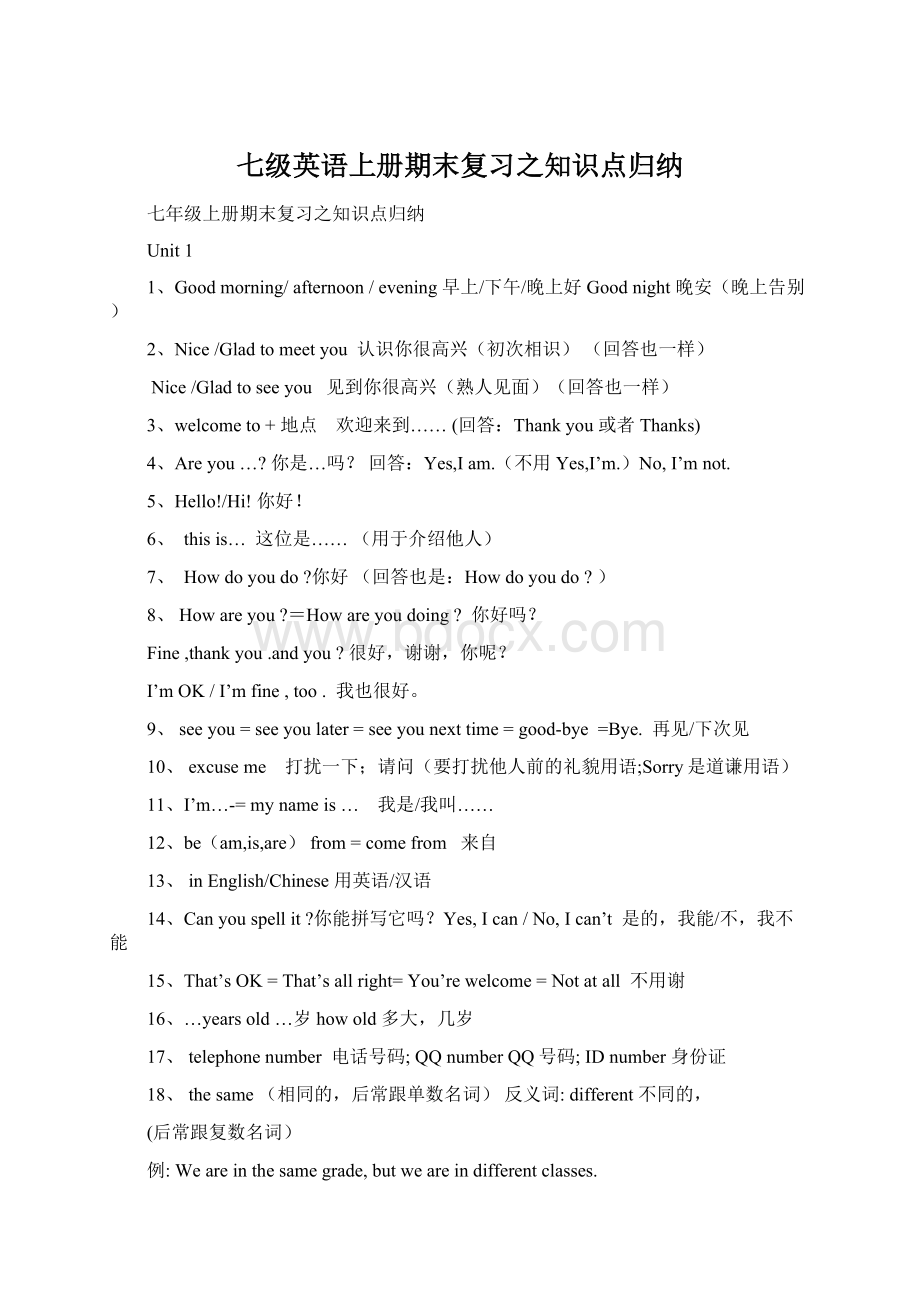七级英语上册期末复习之知识点归纳.docx
《七级英语上册期末复习之知识点归纳.docx》由会员分享,可在线阅读,更多相关《七级英语上册期末复习之知识点归纳.docx(27页珍藏版)》请在冰豆网上搜索。

七级英语上册期末复习之知识点归纳
七年级上册期末复习之知识点归纳
Unit1
1、Goodmorning/afternoon/evening 早上/下午/晚上好Goodnight晚安(晚上告别)
2、Nice/Gladtomeetyou 认识你很高兴(初次相识)(回答也一样)
Nice/Gladtoseeyou 见到你很高兴(熟人见面)(回答也一样)
3、welcometo+地点 欢迎来到……(回答:
Thankyou或者Thanks)
4、Areyou…?
你是…吗?
回答:
Yes,Iam.(不用Yes,I’m.)No,I’mnot.
5、Hello!
/Hi!
你好!
6、 thisis… 这位是……(用于介绍他人)
7、 Howdoyoudo?
你好(回答也是:
Howdoyoudo?
)
8、 Howareyou?
=Howareyoudoing?
你好吗?
Fine,thankyou.andyou?
很好,谢谢,你呢?
I’mOK/I’mfine,too. 我也很好。
9、 seeyou=seeyoulater=seeyounexttime=good-bye =Bye. 再见/下次见
10、 excuseme 打扰一下;请问(要打扰他人前的礼貌用语;Sorry是道谦用语)
11、I’m…-=mynameis… 我是/我叫……
12、be(am,is,are)from=comefrom 来自
13、 inEnglish/Chinese用英语/汉语
14、Canyouspellit?
你能拼写它吗?
Yes,Ican/No,Ican’t 是的,我能/不,我不能
15、That’sOK=That’sallright=You’rewelcome =Notatall 不用谢
16、…yearsold …岁howold多大,几岁
17、 telephonenumber 电话号码;QQnumberQQ号码;IDnumber身份证
18、thesame(相同的,后常跟单数名词)反义词:
different不同的,
(后常跟复数名词)
例:
Weareinthesamegrade,butweareindifferentclasses.
19.Whatisyourtelephonenumber?
你的电话号码是多少?
(注意:
疑问词用what,而不能用howmany/howmuch)(回答:
Mytelephonenumberis…或者It’s…)
20. Whatclassareyouin?
你是在几班?
IaminClassFive.(注意:
Class和Five要大写)
Whatgradeareyouin?
你是在几年级?
IaminGradeSeven.(注意:
Glass和Seven要大写)
①②③④
注意大小写和顺序:
七年级4班:
④③②①
ClassFour,GradeSeven
21. What’sthis/that(inEnglish)?
这是什么?
(回答:
It’sa/an+单数名词.这是……)
What’rethese/those(inEnglish)?
这些是什么?
(回答:
They’re+复数名词.这些是……)
22. Howdoyouspellit?
你怎么拼写它?
E-R-A-S-E-R,eraser.
Unit2
1、描述长相:
某人+has/have+(an/a)+形容词+五官
=某人的五官is/are+形容词
例:
Lilyhasasmallnose.=Lily’snoseissmall.
Ihavebignose.=Mynoseisbig.
2、Iknow=Isee 我明白了
3、That’sright=You'reright那是对的,你说的对。
比较:
That’sOK=That’sallright不用谢
You'reOK=You'reallright你很好呀。
(指身体好)
OK=Allright好的、好吧(表示同意,答应)
4、lookthesame 看起来像(后不跟宾语)
lookdifferent 看起来不一样(后不跟宾语)
looklike…看起来像…(后须跟宾语)
例:
JimandLileilookthesame.=JimlookslikeLilei..
5、lookat +名词看某物;
lookfor+n寻找某人/某物;
lookafter+n照顾某人
6、both两者都;all三者以上都.
both和all放在be动词或情态动词后,行为动词前。
(简称:
Be后行前)例:
Wearebothstudents.(are后)
Webothhaveblackeyes.行为动词前)
WecanbothspeakEnglish.(情态动词后)
7、 givesthtosb=givesbsth 把某物给某人;
(注意:
如果sth是it或them,只能用前者)
例:
givethebooktome=givemethebook把书给我
Giveittome不能说givemeit.
8、havedifferentlooks =lookdifferent有着不同的长相(看起来不像)
havethesamelook=lookthesame有着相同的长相(看起来很相像)
9、abigone一个大的;anoldone一个旧的
10、 in+颜色 或ina/an/the+颜色+衣服
表示穿着……颜色的衣服;用法:
①接在名词的后面,如:
Thegirlinredismysister.穿红衣服的女孩是我的姐姐
②接在Be的后面,如:
Mariaisintheredcoat.
Maria穿着红上衣。
注意:
她喜欢穿红衣shelikesredclothes;不能说Shelikesinredclothes.应去掉in.
11、Myfavoritecolorisred.我最喜欢的颜色是红色/我最喜欢红色。
注意:
①不能说:
Ifavoritered.因为favorite不是动词,不能作谓语。
②favorite前必须用物主代词或名词所有格。
如:
DogsareIfavoriteanimals.I应改为my或Jim’s等词。
12、clothes,pants和shoes做主语,谓语动词用复数;但apairofpants/shoes作主语时,谓语动词用单数形式.例:
Hisshoesareblack.
Apairofshoesisonthesofa.一双鞋子在沙发上。
13、Sorry=I’msorry对不起
回答常用:
Notatall=That’sOK=That’sallright没关系
14、名词所有格:
名词(一般是指人的名词)+’s,表示“某人的”。
如:
李老师的:
Mrlee’s; 迈克的:
michael’s
注意:
s结尾的名词的所有格是直接加上’.如:
我父母的:
myparents’;詹姆斯的鞋子:
James’shoes.
15、of,介词,表示“某物的”,与中文的顺序相反。
如:
简的宠物的名字:
thenameofJane’spet.
16、juniorhighschool初中
ajuniorhighschoolstudent=astudentinajuniorhighschool一名初中生
17、Thisbikeismine=Thisismybike.
这个自行车是我的=这是我的自行车。
注意:
物主代词的使用方法:
后有名词时用形容词性的,后无名词时用名词性的,即:
有名则形,无名则名。
18、who谁;whose谁的,是who的所有格。
如:
Who’sthatboy?
那个男孩子是谁?
Whosebabyisthat?
那是谁的小孩呀?
19、 Whatdo/does+某人+looklike?
询问人的长相
例:
WhatdoesyourEnglishteacherlooklike?
Heisthinandtall.他又瘦又高。
20、 What’s…and…?
…加…是什么?
(回答:
It’s…)
例:
What’sredandyellow?
It’sorange.
What’stwoandfive?
It’sseven.
2加5等于几?
等于7。
21、Jane’sandMaria’s:
Jane的和Maria的(各自拥有)
JaneandMaria’s:
Jane和Maria的(两人共有)
如:
ThisdeskisLucyandLily’s.(两人共有一张课桌)
ThesecoatsareLucy‘sandLily’s.(两人各有自己的上衣)
4、Whoistheletterfrom?
It’sfrommypenpal,Sam.(不用where)
5、Whatcolorbe+东西?
(回答:
It’s+颜色或者They’re+颜色)
例:
Whatcolorisyourdress?
It’sblack.
Whatcolorareyourpants?
They’reblack.
英文一般疑问句及肯定和否定回答
一般疑问句是以be动词、情态动词和Do/Does开头的,用Yes或No回答的疑问句。
Ⅰ、以be动词开头的一般疑问句及答句
①AmI…?
Yes,youare./No,youaren’t.
②Areyou…?
Yes,Iam./No,I’mnot.
③Ishe/she/it…?
Yes,he/she/itis.
No,he/she/itisn’t.
④Arewe/you/they…?
Yes,we/we/theyare.
No,we/we/theyaren’t.
Ⅱ、以情态动词开头的一般疑问句及答句
Can+主语……?
Yes,主语+can./No,主语+can’t(cannot).
Ⅲ、以Do/Does开头的一般疑问句及答句
①Doyou+行为动词?
Yes,Ido/No,Idon’t.
②Dowe/you/they+行为动词?
Yes,we/theydo.
No,we/theydon’t.
③Doeshe/she/it+行为动词?
Yes,he/she/itdoes.
No,he/she/itdoesn’t.
注意事项:
1、肯定和否定回答中必须用人称代词主格,即只能用I,we,you,he,she,it,they等,不能出现其它词,特别注意不能用this,that,these,those等指示代词。
2、肯定和否定回答要保持三个单词,因此当am,is,are出现在句尾时,一定不能缩写。
如:
不能用Yes,I’m;/Yes,he’s;/Yes,they’re.
3、amnot不能缩写,如:
No,I’mnot不能用No.Iamn’t.
4、肯定和否定回答不能出现前后矛盾。
如:
不能说Yes,heisn’t;/No,Ido;/
Yes,shedoesn’t.
Unit3
1、Couldyou(please)+动词原形?
你能做某事吗?
是礼貌问句,答句不能用Yes,Icould(can)./No,Ican’t等。
答句常用:
Sure/Ok/Allright/Noproblem/Sorry,Ican’t等礼貌用语。
MayI+动词原形?
我能做某事吗?
也是礼貌问句,答句也常用:
Sure/Ok/Allright/Noproblem/Sorry,youcan’t等礼貌用语。
2、helpsb.(to)+动词原形==helpsbwithsth帮助某人做某事
注意:
sb用代词时必须用宾格。
例:
你能帮我学英语吗?
Couldyouhelpme(to)studymyEnglish?
=CouldyouhelpmewithmyEnglish?
3、livein+地点住在某地;livewith+人和某人住在一起
4、Whatdoeshesayintheletter?
他在信里说了什么?
Whatdoeshesayonthephoto?
他在电话里说什么?
5、alot=verymuch放在句末,很,非常
例:
Iliketheboyalot/verymuch.
not……atall一点也不……,not要放在be动词、情态动词或do/does的后面。
例:
Iliketheboyalot(改否定句):
Idon’tliketheboyatall.
6、eachother相互,彼此,要放在动词后。
例:
Studentsoftenhelpeachotherinclass.(相互帮助)
7、tellsbsth=tellsth tosb告诉某人某事 。
如:
Pleasetellmeyourname=pleasetellyournametome.
8、 Noproblem 没问题,表示同意=Allright/OK/Sure.
9、speak,say,tell的用法比较
speak的用法:
①speak+语言 说某种语言
如:
speakEnglish说英语speakChinese说中文
②speakto+某人和某人说话
如:
IwanttospeaktoMrLee.我想和李老师说说话。
say的用法:
say后跟说的内容。
如:
sayhellotosb.向某人问好;
saygoodbyetosb.向某人告别
Jimsays:
“Ilikemypetdog.”
Isaytomymother:
“Letmehelpyoucook.”
Tell的用法:
tell常用于表示告诉某人某事。
Pleasetellyourmomaboutit.
10、theGreatWall长城
11、①come/goto+地点 来/去某地,但home、here、there这些是副词,前面不能加to.
例:
gohome回家;comehere来这里;gothere去那里
②gofor+事情例:
goforapicnic去野餐
③go+动词ing例:
gofishing去钓鱼;goshopping去购物
④goto+动词原形去做某事
例:
Theyallgotolookafterhim.他们都去照看他
12、like+动词ing 喜欢做某事
liketo+动词原形想要做某事
13、thinkof认为,thinkabout考虑;
Ithink+句子我认为……
Ithinkheyouareright.否定句常否定think。
例:
Idon’tthinkhecancome.我认为他不会来了.(不能说:
Ithinkhecan’tcome)
14、alittle一点①放在句尾②放在不可数名词前。
如:
Shelikesmilkalittle.她有点喜欢牛奶。
Sheoftendrinksalittlemilk.她经常喝一点牛奶。
15、athome在家;atschool在学校,在上学
16、haveaseat/takeaseat/sitdown 请坐下
17、cook厨师cooker炊具
18、inaschool在学校;inahospital在医院;inanoffice在办公室;但是:
onafarm 在农场上;onthesofa 在沙发上
19、aphotoof one’sfamily某人的全家照
familytree家谱
20、inahospital在医院里(只表示地点)
inhospital住院(因病)
例:
Heisillinhospital.他生病住院
Heisinahospital.他在医院里(不一定是因为生病来到医院)
21、lookaftersb照顾某人
22、teachsbsth=teachsthtosb教某人某东西
MichaelteachesmeEnglish.(不用my)
21、helpyourselftosth. 请随便吃…(招呼一个人)
helpyourselvestosth请随便吃…(招呼多人)
22、I’dlike=Iwouldlike我想要……
24、Wouldlike+to+动词原形=want+to+动词原形 想要做某事
25、somethingtoeat一些吃的东西=food食品
somethingtodrink一些喝的东西=drink饮料
26、Hereyouare . 给你Hereweare.我们到了
27、comein请进goout出去
28、all right =OK 好的
29、 acupoftea 一杯茶twocupsoftea两杯茶
30、 milkforme 我要牛奶
31、 Whynot+动词原形?
=Whydon’tyou+动词原形?
为什么不做某事呢?
What/Howabout+动词ing?
…怎么样?
…好不好?
32、Goodidea 好主意
33、waitamoment =justamoment 等一下,请稍侯
waitforsb等待某人
34、MayItakeyourorder?
可以点菜了吗?
你要点什么?
(餐馆用语)
CanIhelpyou?
=MayIhelpyou?
=WhatcanIdoforyou?
需要点什么帮忙吗?
(服务员用语)
35、eatout 出去吃饭,下馆子
36、have…forbreakfast 早饭吃…
37、havedinner吃正餐
Havebreakfast吃早餐
Havelunch吃午餐
Havesupper 吃晚餐
38、 akindof… 一种…;…allkindsof 各种各样的…
39、bekindtosb 对某人友好=befriendlytosb
例:
MissGaoiskindtoherstudents.高老师对她的学生很友好。
40、suchas 例如
例:
Ilikefruits,suchasoranges,bananasandapples
41、beglad+to+动词原形很高兴地做某事
例:
Iamgladtomeetyou,
Iamgladtobehere.
42、Whatdo/does+某人+do?
==What+be+某人?
==What’s one’sjob?
回答:
某人+be+职业.
例如:
Whatdoesyourfatherdo?
=Whatisyourfather?
=What’syourfather’sjob?
回答:
Heisateacher.
Unit4
1、try…on 试穿(tryon不简单,it/them放中间)
2、 We/Iwilltakeit 我们/我买下了(这里的take相当于buy)
3、 buysthforsb=buysbsth 给某人买某物;例:
BuyashirtforJim=buyJimashirt给Jim买个衬衫
4、I’mjustlooking 我只是看看;
5、threehundredandsixty-five365
(hundred不用复数;百位数和十位数之间加and,十位数和个位数之间加”-“)
6、 apairof 一对/一双/一条/副……例:
apairofpants一条裤子apairofshoes一双鞋子apairofglasses一副眼镜
7、overthere 在那边
8、 Areyoukidding?
你开玩笑吧
9、abottleofmilk一瓶牛奶threebottlesofmilk三瓶牛奶
10、thankyouallthesame 仍然谢谢你;
11、 Isthatall?
就这么多吗?
That’sall.就这么多吧
I2、Ithinkso.我认为是这样的.
Idon’tthinkso.我认为不是这样的.
13、当把东西给某人时可以说:
Hereyouare或Hereitis.(给你)
14、Don’tworry.别担心worryabout+宾语
如:
DoyouworryaboutyourEnglish?
15、 alittle+不可数名词(肯定);一点,一些;
16、befree =havetime 有空的;反义词:
bebusy=havenotime
Areyoufreetomorrow?
==Doyouhavetimetomorrow?
17、in,on,at表示时间的用法:
①在某一天使用介词on:
OnSunday在星期天
OnSundaymorning在星期天上午
OnSundayafternoon在星期天下午
OnSundayevening在星期天晚上
②在某个时刻用at:
a